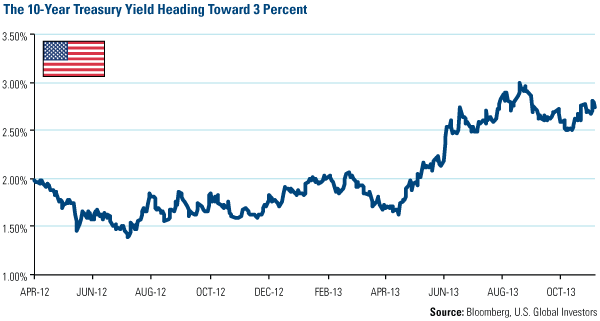The Economy and Bond Market Radar (November 25, 2013)
Treasury bond yields rose by 4 basis points this week as economic data came in better than expected, further encouraging outflows from fixed-income securities into the broader equity market.
Strengths
- Weekly applications for unemployment benefits fell by 21,000 last week to a seasonally adjusted 323,000, the lowest level since late September. Analysts were expecting jobless claims to fall to 335,000. The less volatile four-week average fell 6,750 to 338,500 and has dropped for the third-straight week. Both figures are near prerecession levels.
- Retail sales rose 0.4 percent in October, handily beating economists’ expectations. Also, sales for September were revised upward, from a decline of 0.1 percent to an increase of 0.5 percent.
- German business confidence rose to the highest level since April 2012, supporting the view that economic growth could increase going into the new year.
Weaknesses
- Stocks reacted negatively on Wednesday after the minutes from the latest Federal Reserve meeting showed the central bank could cut back on its bond-buying program even if the job market doesn’t improve dramatically.
- The HSBC China Flash Purchasing Managers’ Index (PMI) fell to a two-month low of 50.4 in November. This missed expectations for a modest decline to 50.8, and was lower than 50.9 the previous month. The latest manufacturing report showed that export orders fell, suggesting a weaker environment.
- The National Association of Realtors says home re-sales fell 3.2 percent last month from September to an annual pace of 5.12 million. That’s down from a 5.29 million pace in August and the slowest since June.
Opportunities
- Despite recent conflicting commentary, the Fed continues to remain committed to an overall accommodative policy and is unlikely to raise interest rates in 2013 or 2014.
- Key global central bankers remain in easing mode such as the European Central Bank (ECB), Bank of England and the Bank of Japan. An ECB policymaker commented this week that the ECB could adopt negative interest rates or quantitative easing to lift inflation.
- There remain many moving parts to the taper decision, and it is very possible that tapering could be delayed well into 2014.
Threats
- Inflation in some corners of the globe is getting the attention of policymakers and may be an early indicator for the rest of the world.
- Trade and/or currency “wars” cannot be ruled out which may cause unintended consequences and volatility in the financial markets.
- The recent bond market selloff may be a “shot across the bow” as the markets reassess the changing macro dynamics.















